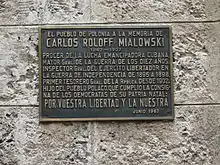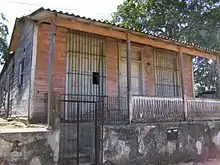Carlos Roloff
Carlos Roloff (Karol Rolow-Miałowski or Carlos Roloff Mialofsky; August 26 or November 4, 1842 – May 17, 1907) was a Cuban general and liberation activist, fighting against Spain in the Ten Years' War and the Spanish–American War.
Carlos was born in Warsaw (Russia Occupied Poland) in a Polish family. Due to his father's role in the November uprising, the family moved to Königsberg, where Karol was attending trade and military schools. After his father's death in 1862, the family moved to the USA. Carlos served in the Union Army during the American Civil War in the 9th Ohio Infantry regiment and was an officer when the war was over.
After the war he worked as a clerk in a sugar trade company and this led him to Cuba.

From the beginning of his stay in Cuba, he was an active member of the local community. Through the "El Progresso" Club, the masonic lodge "San Juan" and professional contacts he was well known to local VIPs. Therefore, in 1868 the leaders of the independence movement offered him rank of general in the Cuban forces.
After the war he was forced to leave Cuba. He moved to the USA, where he became an activist, raising funds and arms for the Cuban forces.
In 1879, on a ship loaded with arms and ammunition, he sailed to Cuba to take part in the Little War, but expedition became stuck in Jamaica. Having no way to Cuba, Roloff moved to Honduras where he became the Chief of Banco Central in Amapala.
During 1892-1895 he was back in the USA, cooperating with José Martí and the rising Cuban Revolutionary Party.
On May 19, 1895 he landed in Cuba with one of three groups sent from USA to fight against the Spanish forces in the 1895 war. The forces led by Roloff had some successes and he was promoted.
In the meantime, the Cuban-Spanish war turned into the Spanish–American War, and the Spaniards were defeated in Cuba. In 1898 Carlos Roloff left the army. In 1901 he was nominated Treasurer of Cuba Republic and stayed in the role until his death.
In 1902, Cuban citizenship was granted to him by the Cuban court.
